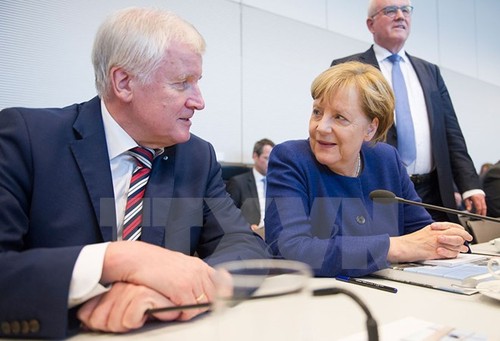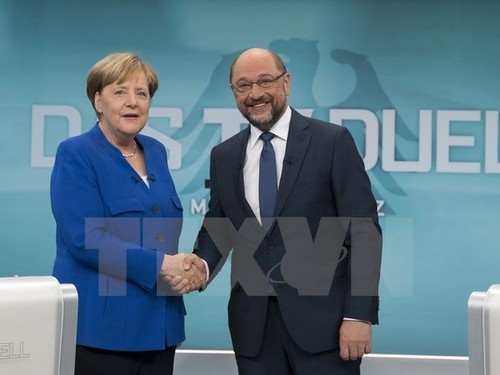 CDU President, German Chancellor Angela Merkel (right) and CSU President Horst Seehofer (left) at a meeting in Berlin (Source : AFP/TTXVN) CDU President, German Chancellor Angela Merkel (right) and CSU President Horst Seehofer (left) at a meeting in Berlin (Source : AFP/TTXVN) |
As the result of the 5-day negotiations which ended last Friday, the SPD will likely organize an extraordinary congress on Sunday to schedule official talks on building a coalition government. SPD members will make their final decision in a public vote in February.
If the talks go smoothly, a new coalition government will be established by April 1st. Otherwise, Germany will have to hold another election or Chancellor Angela Merkel will have to lead a minority government.
Initial positive signs
In last week’s exploratory talks the SPD and CDU/SDU parties agreed to lower income tax on rich people and abandon the goal of reducing CO2 40% by 2020. They also agreed to begin negotiations for a new coalition government in the next few weeks. The two parties said they will work closely with France to reform and strengthen the Eurozone to enable it to respond more effectively to global crises. But further discussion is needed on migration policy.
 German Chancellor Angele Merkel (left) and President of SPD Martin Schulz in a direct talk on TV in Berlin (Source: EPA/TTXVN) German Chancellor Angele Merkel (left) and President of SPD Martin Schulz in a direct talk on TV in Berlin (Source: EPA/TTXVN) |
With progress in Germany toward a coalition government, France and Germany have started efforts to reform the EU. Their finance ministers are scheduled to meet this week in Paris.
Stable German government ensures EU stability
The SPD has been in a coalition with Ms Merkel’s party during the last 8 years. But since the September election, SPD leaders have wanted to make SPD an independent opposition party. The SPD is the EU’s strongest proponent in Germany and its leader, Martin Shulz, is the most influential figure on EU issues. If the SPD becomes an opposition party, it could hamper the EU’s reform efforts.
A stable German government is important because European countries consider Germany a pillar of stability in the region. Since the election three months ago, Germany has not had a new government but recent talks have made progress toward establishing a stable new coalition.